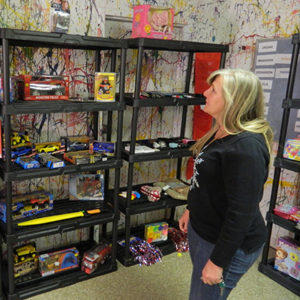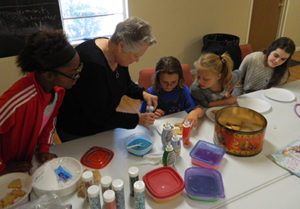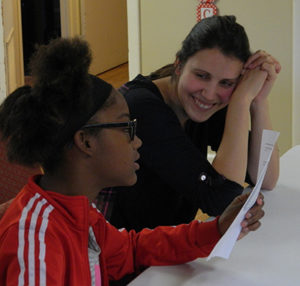ABILENE—Not everything at Alameda Community Center in west Abilene operates quite the way Director Erica Currie envisions, and she couldn’t be happier.
When neighbors take ownership of programs and projects at the center, she knows she has done her job right.
“It’s all about empowerment,” said Currie, director of the center and associate minister of missions at Pioneer Drive Baptist Church in Abilene. “People like to feel useful, and they want to contribute.”
Alameda Community Center is home to an afterschool program and a ministry to at-risk youth, as well as a meeting place for the Alameda Neighborhood Association and a congregation, The Church at Alameda.

It also offers a seasonal Christmas store where neighborhood parents who volunteer for a couple of hours are eligible to buy donated items to give their children, discounted to 10 cents on the dollar.
In the future, she hopes the center can offer a similar store in late summer with back-to-school supplies.
“It’s not about making money. It’s about making it possible for parents to provide for their own children,” Currie said. “We’re just trying to level the playing field for them.”
Drawn by a support group
Fifteen years ago, when Currie first set foot in the space Alameda Community Center now occupies, the building housed Westside Baptist Church. She was not a Christian, but she showed up to attend a support group for parents.
“There were not a lot of resources available for parents with special-needs children here in Abilene at that time,” she recalled.
The congregation also offered a Sunday school class for developmentally challenged children. Currie’s husband, Mike, thought it would be good for their autistic son, Harrison, to attend.
Six months after her family began attending church together, Erica Currie made a profession of faith in Christ. Within a couple of months, both she and her husband were baptized at Westside Baptist Church.
‘A place that was steeped in fear’
In addition to ministering to the special-needs community, leaders at Westside—which became New Haven Baptist Church—also wanted to reach their immediate neighborhood. Members became involved in ministries to Alameda—a low- to moderate-income area that had become infested with gang activity and drug dealing.
“There was one time where we had two homicides within an 18-month period,” Currie recalled. “It was a place that was steeped in fear.”
Within a relatively short time, several key events occurred. The pastor at Currie’s church resigned and moved to another city. Residents formed the Alameda Neighborhood Association out of a desire to improve their immediate community, northeast of Dyess Air Force Base. And Pioneer Drive Baptist Church wanted to develop a community outreach ministry to Alameda.
Build on community strengths

Nathan Adams, minister of missions at Pioneer Drive, wanted to help the church move from doing ministry for people in need to doing ministry alongside people in the community, building on their strengths.
Influenced by the Christian community development models presented in Toxic Charity by Robert Lupton and When Helping Hurts by Brian Fikkert and Steve Corbett, Adams helped communicate the principles of those books to key leaders at Pioneer Drive.
First, the church asked whether what it was doing enabled dependency or empowered people to improve their own lives.
Second, the church examined whether the ministries made an impact on the lives of people on the margins or whether they “just made us feel good,” Adams noted.
‘Neighbors helping neighbors’
Adams talked with Currie about leading a community center at the site of the disbanded Westside Baptist Church that would seek to build on community assets and help residents to take ownership of their neighborhood and its future.
“We want to help neighbors develop their own gifts and recognize their own value,” he said. “It’s neighbors helping neighbors.”
Currie recognized the merits of the approach. When she looked at the neighborhood to determine its assets, she realized the residents had old tires—lots of them. A home-improvement TV program inspired her to organize a tire-painting party in Alameda. So, she worked with Alameda neighbors to turn eyesores into decorative planters and a playground obstacle course.
She also started prayer-walking the neighborhood.
Building relationships
“That turned out to be a great way to meet people,” she recalled.
In the process, she recognized the secret to revitalizing the neighborhood—building relationships.
Kevin Scroggins, a recent Hardin-Simmons University graduate who leads the programs for youth at the Alameda Community Center, agrees with the approach.
“My goal is for these young people to draw closer to Jesus Christ, whether that is through the Bible study and discipleship or the games and the fellowship,” he said.
Transformation in the community
As Currie and others at the center earn the trust of neighborhood residents and share the love of Christ with them in natural ways, transformation occurs.
She recalled breaking up a shouting and cursing match between two women in the neighborhood. “There was no love lost” between the two women or their families, Currie remembered.
However, in time, relationships developed. When the home of one of the women burned recently, the woman with whom she had been fighting took the lead in raising money for the displaced family.
Recognizing the value of neighbors helping neighbors involves relinquishing control, Currie said. For example, parties the Alameda neighbors plan look significantly different than events she would organize.
“It’s not my kind of music,” she said, noting the only requirement she places on the party planners is that the lyrics are free from profanity. “They bring in their own D.J. and play their music. It’s not the way I would have done it, but it’s their party.”
‘We want to contribute, too’
Sometimes, she needs to be reminded. At one point, a woman in the neighborhood volunteered to cook for the weekly leadership luncheons at the center. Initially, Currie turned down her offer, saying the staff could handle the cooking chores.
“Sister, you need to humble yourself,” the woman told Currie. “We want to contribute, too.”
Pleased to see someone had taken to heart the message of empowerment she had been preaching, Currie relinquished lunchtime cooking duties.
When neighbors in Alameda originate a program or make it their own, it succeeds, Currie noted. When it is imposed or not allowed to take root naturally, it fails.
For example, she and others identified Alameda as a food desert—an area where residents lack access to fresh produce and other healthy groceries. So, they envisioned a community garden as the answer.
“We didn’t really ask the people in the neighborhood if they wanted it,” she acknowledged. Currie and other leaders at the center had to write off the community garden as a failed experiment.
Putting down roots in the community

However, one positive benefit grew from the garden. Gina and Trevor Allen met there as they worked together planting and weeding, and while the plants failed, their relationship blossomed.
Gina, a graduate of Abilene Christian University who is in her third year on staff at the center, recalled praying, “Lord, I sure would like to live here in this neighborhood.” Trevor shared the same desire, and they decided to plant their lives—at least for the immediate future—in Alameda.
Within three years, Alameda Community Center will move toward becoming a nonprofit organization separate from Pioneer Drive, although the connections between members of the church and the center will remain strong.
The center depends on volunteers from Pioneer Drive and other churches to lead the after-school program. However, people from the neighborhood increasingly are assuming responsibility for other ministries, Currie noted.
It’s a far cry from the days when she urgently prayed for God to “send laborers,” not knowing from where they would come.
“I stand in awe of God,” Currie said. “I think about all the prayers that have been sent up, and then I see what God is doing here.
“He probably would be doing it anyway. He probably didn’t need me here. But it’s pretty cool that he gave me a front row seat to watch it.”
This is part of an ongoing series about how Christians respond to hunger and poverty. Substantive coverage of significant issues facing Texas Baptists is made possible in part by a grant from the Prichard Family Foundation.
Read more articles like this in CommonCall magazine. CommonCall explores issues important to Christians and features inspiring stories about disciples of Jesus living out their faith. An annual subscription is only $24 and comes with two free subscriptions to the Baptist Standard. To subscribe to CommonCall, click here.















We seek to connect God’s story and God’s people around the world. To learn more about God’s story, click here.
Send comments and feedback to Eric Black, our editor. For comments to be published, please specify “letter to the editor.” Maximum length for publication is 300 words.